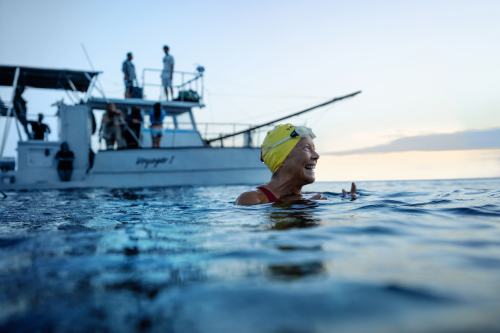
Liz Parkinson/Netflix
MOVIE REVIEW
Nyad (2023)
“Nyad” is a movie about the body that has almost nothing to do with sex, so of course it’s about lesbians of a certain age; but the lesbianism at the core of this story is both utterly essential and completely irrelevant. Diana Nyad’s (Annette Bening) sexuality is very much a part of her, but it comes second to her frankly irritating self-belief; and she doesn’t worry about that because she has delegated her interpersonal skills to her best friend, Bonnie Stoll (Jodie Foster). The closeness of Bonnie and Diana is beyond sex, and almost beyond friendship, in that it’s two people who love and need each other without their bodies coming into it. But Diana’s body is at the core of the story – will she, a woman now in her 60s, be able to complete a 105-mile swim from Cuba to the Florida Keys without dying? – and the way in which the movie asks these questions without being weird about the body at its core is remarkable.
Directors Elizabeth Chai Vasarhelyi and Jimmy Chin, working from a screenplay by Julia Cox, wisely and more relatably chose to focus on the problems of the mind. Diana excelled as a swimmer from childhood, made her name in her 20s through a record-setting swim around the island of Manhattan, then attempted the Cuba swim which met with devastating failure. As old age becomes unignorable and the realities of diminishing opportunities begin to sink in, Diana seizes on the idea of completing the Cuba swim and throws herself into training for the first time in 30 years. Bonnie, a former professional athlete herself, is taken aback by the sudden enthusiasm, but finds herself unable to ignore Diana’s pleas to act as her coach and to help solve the problems inherent in this endeavor. The problem of how to survive in the water without shark attack is solved by a crew of kayakers who will follow Diana trailing anti-shark electric pulses in the water. The problem of jellyfish is not considered until, on one of the attempts, both Diana and one of the medics are stung so badly they nearly die. The following scene of Diana in a hospital bed, with a scarred and swollen face, insisting she is absolutely fine, is extremely funny. And the problem of the water currents is solved by hiring John Bartlett (Rhys Ifans playing American, quite a shock), an expert fisherman of the Florida waters who knows how to maximize the route of the guide boat in order to minimize the time Diana will need in the water.
Claudio Miranda, the cinematographer who won an Oscar for the survival-at-sea story “Life of Pi,” here makes the beauty and the terror of the open ocean secondary to a closer focus on the world of the guide boat and the tricks used by Bonnie and the crew to keep Diana focused and moving forward. There’s a repeated motif of sunlight shining out from behind somebody, used heavily in the flashbacks which explain Diana’s childhood and the choices which brought her here, which both emphasize the sense of memory without rose-tinted glasses, which keeps it fresh. Ms. Bening is clearly aiming for an Oscar herself here (and why not) and uses her body with a total absence of glamour. The self-awareness she brings to Diana, whose relentless drive for excellence is both her greatest personal attribute and her biggest personal failing, means that the humor and pathos is as underplayed as the physical requirements of Diana’s life. It’s an attractive, rounded performance.
Ms. Foster, who rarely acts anymore and here is openly playing a lesbian for the first time since she publicly acknowledged her sexuality, is so casually excellent it’s hard to admire just how truly good she is. The interplay between the two women – most amusingly demonstrated through a scene of raw schadenfreude that had the London Film Festival audience laughing out loud – between whom there are no secrets anymore, with a knowledge and attention that is indistinguishable from love. Because it slowly becomes clear this story is an act of love – Diana’s belief in her own body, Bonnie’s belief in Diana and the experts’, including John, willingness to use their knowledge for Diana’s benefit. All human achievement might be directed through a specific person – like a movie director, for example – but it takes a crew behind the scenes to make that achievement possible; and it’s fascinating to see how that knowledge makes itself felt.
There is but one major quibble. Most movies about female athletes focus on how they are isolated by their pursuit of excellence regardless if they play a team sport. “Nyad” perhaps goes too far the other way in emphasizing how a solo athlete must learn to embrace the group nature of athletic activity in order to have any genuine success. In a movie about people who are generally not taken seriously anyway due to their gender, age and sexuality, it’s slightly odd to have this preachy message be the central emphasis. But this message was undoubtedly designed to help lure younger audiences in.
Comments